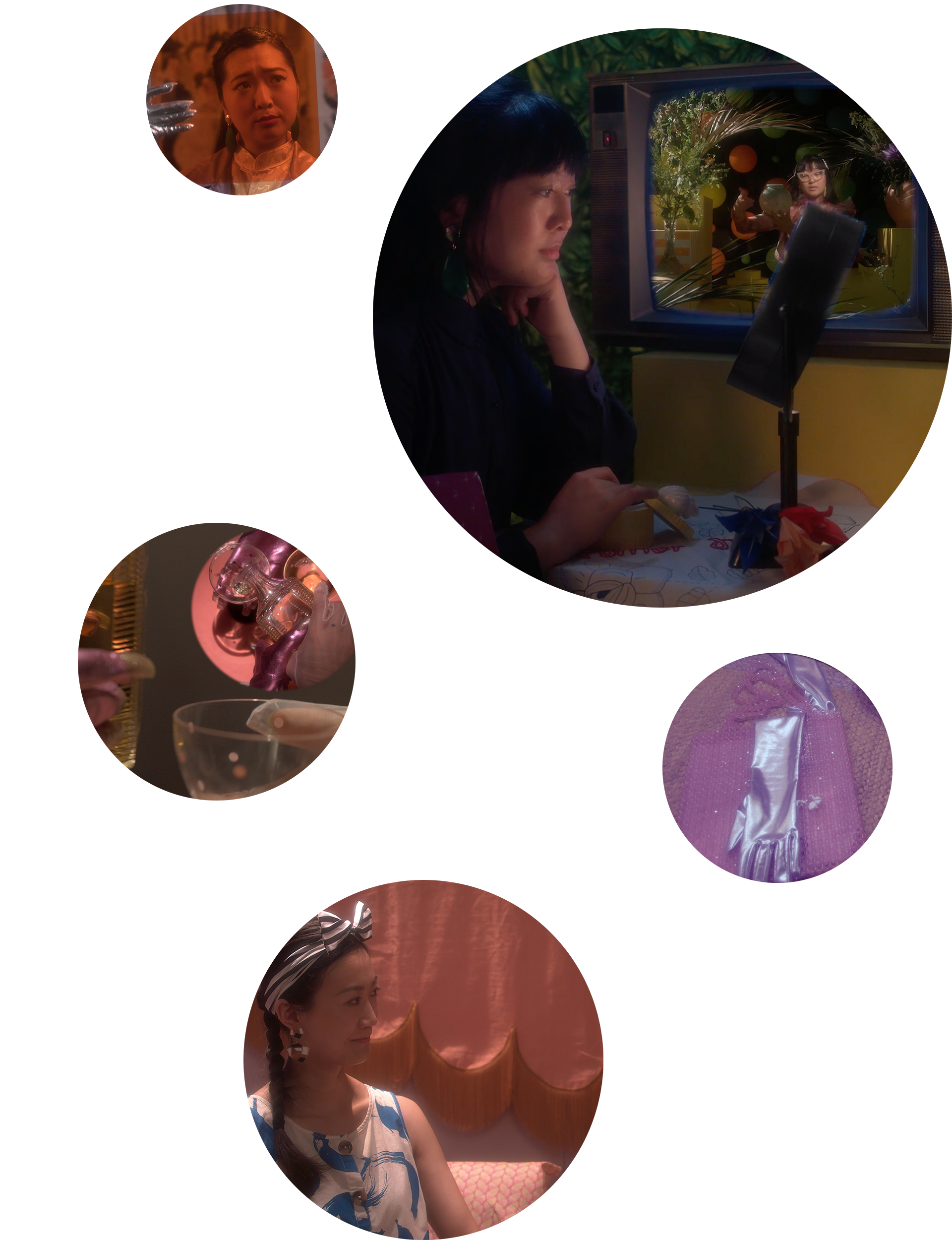Sweaty Scales (2019)

Text by Kyle Bellucci Johanson
Cream puffs have fallen, hands have been gloved,
and it appears people may be wearing masks.
The director of photography is dancing — it's what everyone wants to do well, Lisa may be on the fence.
Oliver is feverishly sweating.
The sub-text is anxiety.
This thing has style, and it’s all about love.
Memphis-design style, fogged-lens-acid-soap-opera style, neon-alien-playhouse style.
Powder-blue-soft-power-pantsuit style, petting-the-candy-watering-can style.
He pours too much soy sauce into his bowl for dim sum.
The sub-text is anxiety.
It’s weird and sexy. Abolition can feel like that.
Witchy kinship vibes and an unconscious mind wondering if she feels “the same.”
After all they are both wearing very cute matching outfits.
If only that nice narrator with the suit and wry smile would just tell us, that would be easier.
Is she God? She seems to know a lot.
Someone is being seduced.
Pop-up Asian schoolgirls, secretaries, subs, and a sex worker named Suzie Wong.
The trailer for her 1960 movie says she’s “irrepressible,” that
Hong Kong is a “strange” place, and that “her world will soon be yours.”
There are many implications.
Dragon-lady style, drag-queen-lady style,
framing the gaze is a gay affair, thank goodness for rhinestone nails and leather.
The silk kimono is hot.
What are these sweaty scales? Are they a slippery armor or an over-exorcized device for determining value? Will they assign us identity, as dom or sub — puppet or master? Are they responsible for the imaginary lines traced around territories and beings? Are they capable of delivering justice? Perhaps the sweat in that lady’s eyes is what made her become blind in the first place.
Who has the privilege to be human?
The angles are all a bit wonky, the camera lurches as if possessed. The White ghost may not be the only spectre in the room.
Others might be here too, reminding the Lilly blossom to
“Salve salvage in the spin.
Endorse the splendor splashes;
stylize the flawed utility;
prop a malign or failing light–
but know the whirlwind is our commonwealth.”1
Lisa can’t help the way that she feels. Oliver can’t help the way that he feels.
That is a radical thing to say, how in this whirlwind do they know that?
Can we know where natural feelings end and enculturated ones begin?
Can love be purely real, and should that purity really be desired?
Can these sweaty scales measure that too? No wonder they are sweaty, this is a lot of work.
There’s definitely something coming over, a possession by those dispossessed. This love spectacle has some ghosts of seasons past. It feels like they came over a long time ago.
Was Oliver dead to begin with? What a dickens of a twist that would be.
The end is blackness. In the break. Something was definitely broken. The ad on TV won’t change no matter how hard those buttons are pushed. Something has narrative surrounded and appears to have been here all along, orienting us to face ourselves and our rituals of racial-capitalist identities and their endless representations.
The screen may be hard to change but the selfie mirror looks more optimistic. Perhaps it could become a consciousness-raising circle if we allow ourselves the self-reflection.
And Ms Brooks is still here whispering, with her Second Sermon on the Warpland, saying:
“It is lonesome, yes. For we are the last of the loud.
Nevertheless, live.
Conduct your blooming in the noise and whip of the whirlwind.”
This thing has style, and it’s all about love.
—
1 Gwendolyn Brooks, Second Sermon on the Warpland, Chicago: Third World Press, 1994.











